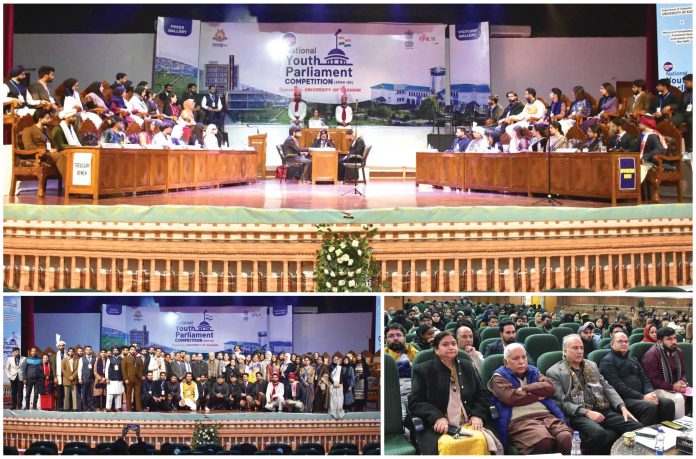SRINAGAR: The University of Kashmir (KU) hosted the 17th National Youth Parliament Competition, organised by the Department of Students’ Welfare (DSW) under the aegis of the Ministry of Parliamentary Affairs, at the University’s Convocation Complex.
The event brought together trained student parliamentarians who demonstrated strong knowledge of legislative procedures and parliamentary conduct. The proceedings were attended by faculty members, officers, research scholars and students.
Vice-Chancellor KU, Prof. Nilofer Khan commended the participants for their confidence, clarity and discipline. She said that the University remains committed to nurturing leadership, critical thinking and democratic values, and that such platforms help students gain deeper insights into parliamentary functioning.
Justice (Retd.) Hasnain Masoodi, former MP and sitting MLA, appreciated the University’s efforts, noting that Youth Parliament initiatives play a vital role in strengthening democracy at the grassroots.
Registrar KU, Prof. Naseer Iqbal, said that the Youth Parliament is an important platform for shaping informed and responsible young citizens. He highlighted the commitment and maturity displayed by students during the training and reiterated the University’s support for initiatives that broaden students’ national exposure.
Shri Sharad Dwivedi, Under Secretary, Ministry of Parliamentary Affairs, praised the professionalism with which the University conducted the event and lauded the enthusiasm and preparedness of the participants.
Earlier, Dean DSW KU, Prof. Pervez Ahmed, delivered the welcome address and thanked the Ministry for its continued support.
Dr. Shahid Ali Khan, Cultural Officer DSW KU, and mentor of the KU’s Youth Parliament team, shared insights into the preparation process. He informed that 55 students from the University departments and affiliated colleges underwent an intensive 60-day training covering key aspects of Lok Sabha procedures, Question Hour, legislative business, and overall parliamentary conduct—enabling them to perform with authenticity and confidence.
Earlier, 51 teams from across India competed at the group level, out of which only eight—including the University of Kashmir—qualified for the national round. These top eight teams will now compete for the final honour, with the winning team earning an opportunity to perform inside the Parliament of India before Members of Parliament and Union Ministers.


